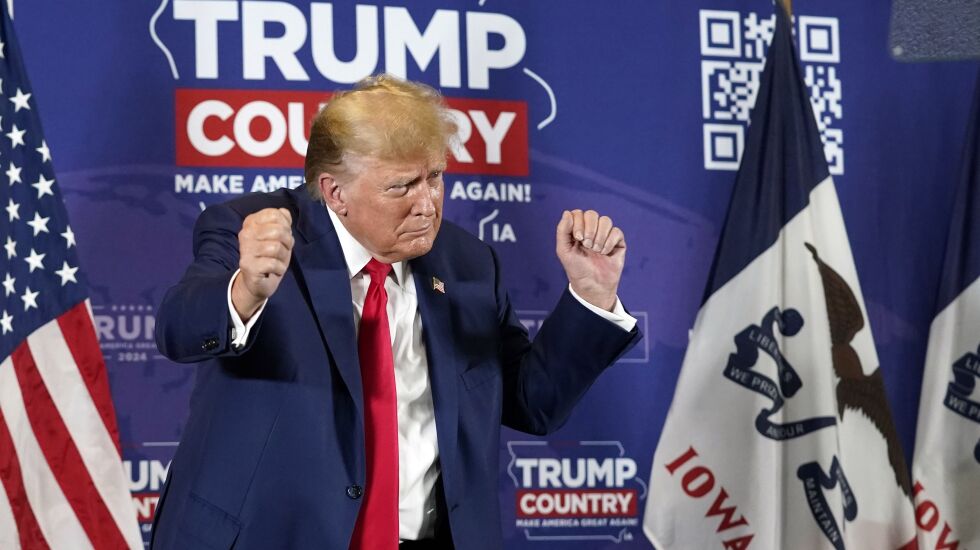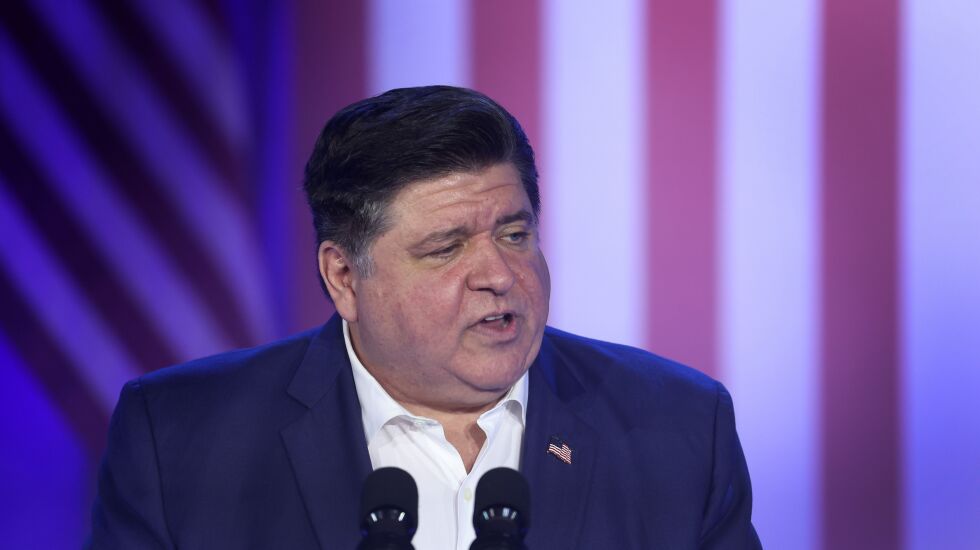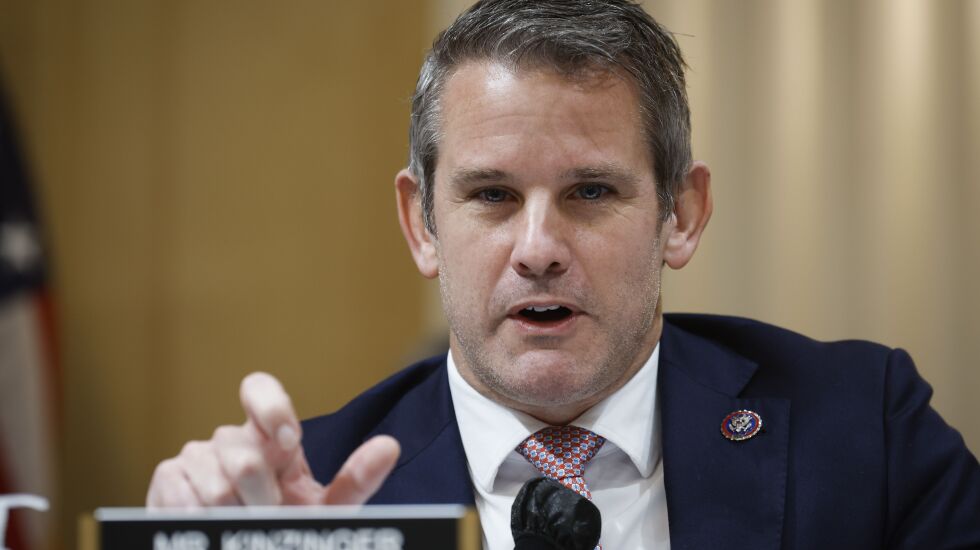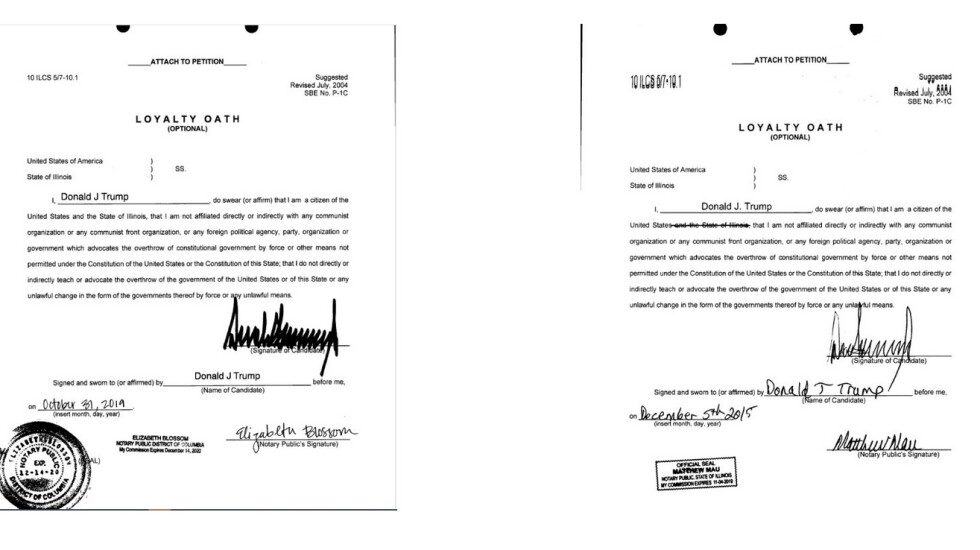
Donald Trump didn’t submit a loyalty oath that political candidates in Illinois have been signing for more than a half century asserting that they won’t “advocate the overthrow of the government” — a pledge that holds new resonance on the third anniversary of the Jan. 6 insurrection.
That’s a departure that his presidential campaign isn’t explaining after Trump signed and submitted the document to Illinois election authorities for the 2016 and 2020 elections, when he ran against Democrats Hillary Clinton and President Joe Biden.
Under Illinois law, presidential candidates wanting to be on the state’s March 19 primary ballot had to turn in their nominating petitions to the Illinois State Board of Elections on Thursday or Friday, and the loyalty oath is a time-honored part of that process.
A WBEZ/Chicago Sun-Times analysis of those petitions found that Biden and Republican Florida Gov. Ron DeSantis signed the oath, as did several lower-tier Trump acolytes in Illinois, but not Trump.
“Why wouldn’t he sign it?” said former Republican U.S. Rep. Adam Kinzinger, who served on the House Jan. 6 select committee and said he signed the state loyalty oath in each of his six terms as congressman.
“Has he been advised maybe not to sign it because maybe there’s some legal exposures…given that oath, if he signed it, would be a violation of everything he actually did on Jan. 6th, 2021, and leading up to it?” Kinzinger said.
The oath is a vestige of the red-baiting era of former U.S. Sen. Joseph McCarthy in the 1950s.
In part of the oath, candidates swear they are not communists nor affiliated with communist organizations. In another section, they attest that they “do not directly or indirectly teach or advocate the overthrow of the government of the United States or of this state or any unlawful change in the form of the governments thereof by force or any unlawful means.”
Signing is entirely optional since federal courts ruled it unconstitutional on free-speech grounds, but Illinois lawmakers left the oath in state law.
Countless candidates, in flag-waving fashion, have signed it over the years even though it’s no longer compulsory.
It’s not clear why Trump chose not to sign the oath for the 2024 election — when his nominating petitions are being challenged on grounds that assert he’s disqualified to run under the 14th Amendment’s ban on insurrectionists seeking public office.
A Trump campaign representative did not respond to email inquiries Friday.
Saturday marks the third anniversary of the Jan. 6 insurrection.
Biden observed the occasion Friday with a blistering speech in which he characterized Trump as a mortal threat to democracy and described his conduct on Jan. 6 as “among the worst derelictions of duty by a president in American history.”
Trump was charged last August by a federal grand jury for conspiracy and obstruction of justice. The charges were connected to his alleged efforts to overturn the 2020 presidential election by spreading lies about election fraud and sending a crowd of supporters to the Capitol on Jan. 6th, 2021 with directions to “fight like hell.”
The ensuing overrunning of the Capitol, as presidential results were being certified, was linked to seven deaths, attacks on more than 140 police officers and criminal charges against 1,265 people, including charges of assaulting peace officers with deadly weapons, entering restricted areas with weapons and obstructing an official government proceeding.
More than 700 of those charged have pleaded guilty and entered into plea agreements, while nearly 140 more were found guilty at contested trials, Justice Department data show.
A voting-rights organization called Free Speech for People, five Illinois voters, and two Chicago law firms are contesting Trump’s nominating petitions based on his conduct before and during the insurrection.
Challenges against Trump are pending in 15 other states, according to an organization tracking them, and his name, for now at least, has been struck from the ballot in two others — Colorado and Maine.
On Friday, the Supreme Court said it will hear Trump’s appeal of the Colorado Supreme Court decision barring him from the ballot in that state. The case will be argued Feb. 8.
On Friday, a campaign spokeswoman for Democratic Gov. J.B. Pritzker, a frequent Biden surrogate, belittled Trump for not signing the oath.
“Pledging not to overthrow our democracy is a hard thing to do when you’ve already attempted it once,” Pritzker spokeswoman Christina Amestoy said.

State election records show Trump’s other Republican primary opponents, former South Carolina Gov. Nikki Haley and former New Jersey Gov. Chris Christie, did not sign the state loyalty oath. Christie signed the document during his 2016 run for president.
Neither the Biden campaign nor the campaigns of Trump’s Republican rivals would comment on their decisions to sign or not sign the document.
Some of Trump’s Republican political allies in Illinois did sign the oath. State election records show U.S. Rep. Mary Miller and her husband, state Rep. Chris Miller, R-Hindsboro, both did for this year’s elections. Trump’s endorsement was pivotal in the congresswoman’s 2022 election win against Republican U.S. Rep. Rodney Davis.
Chris Miller attended Trump’s Save America Rally on Jan. 6 but said he did not enter the Capitol or participate in violence. Still, the Illinois House passed a resolution in March 2021 denouncing Miller for having “participated and publicly promoted his role in a rally that led to a violent insurrection of the Capitol.”
The Millers’ Trump-endorsed ally Darren Bailey, a former Republican gubernatorial nominee now running for Congress, also signed the loyalty oath. Running to unseat fellow Republican U.S. Rep. Mike Bost in the March primary, Bailey signed the document for 2022 and 2024, state records show.

Kinzinger said that Trump’s having signed the loyalty oath before the insurrection and not now should be interpreted literally by voters.
“What was the world like when he signed it in 2016 and when he signed it in 2020?,” Kinzinger said. “Well, at that point, there had not been an attempted insurrection on the federal government
“The difference between the last two times he did it, and this time, when he didn’t, is he has a track record of trying to overthrow the government.”








